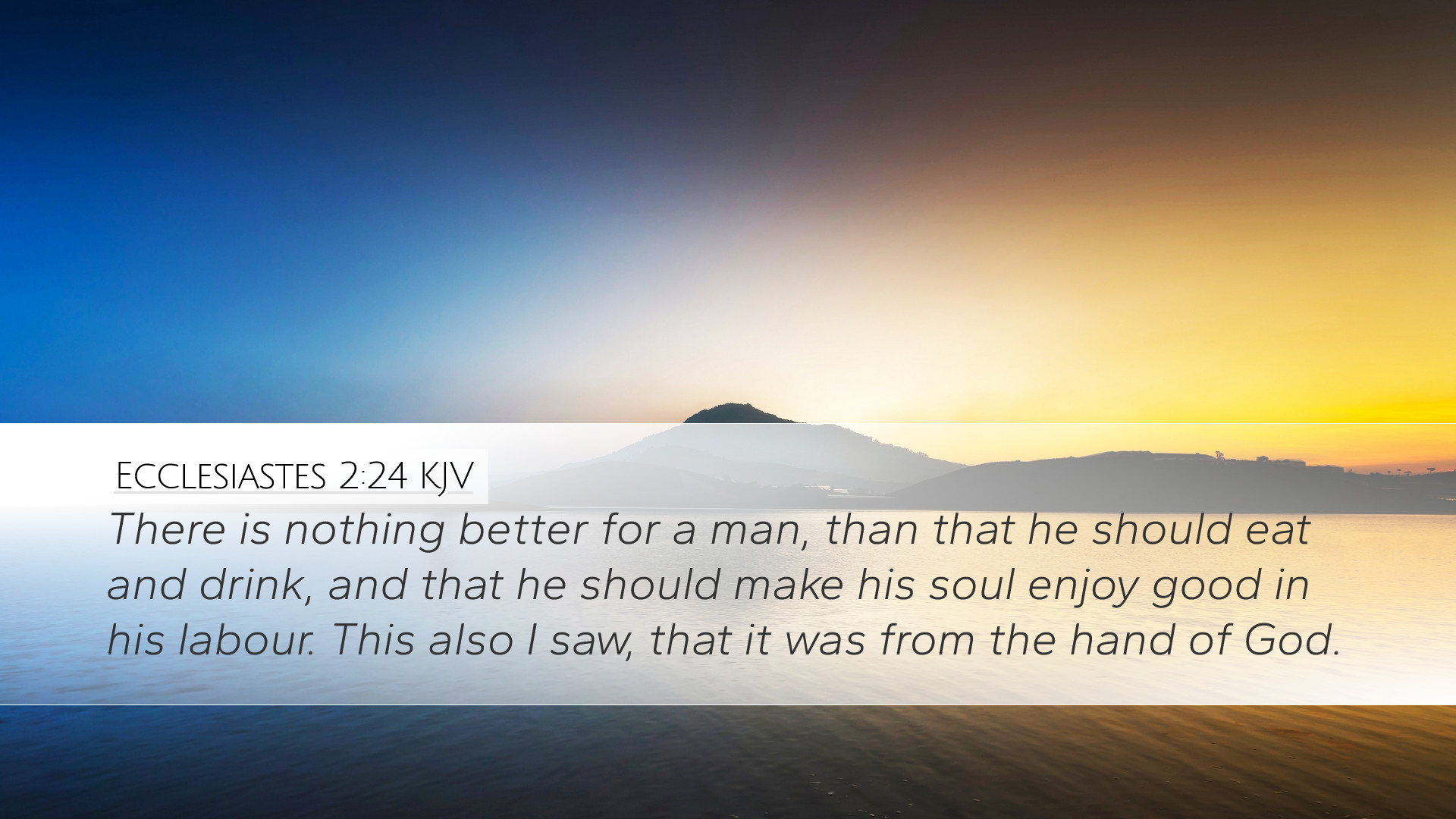Commentary on Ecclesiastes 2:24
Ecclesiastes 2:24 (KJV): "There is nothing better for a man, than that he should eat and drink, and that he should make his soul enjoy good in his labour. This also I saw, that it was from the hand of God."
Introduction
The Book of Ecclesiastes, attributed to Solomon, presents profound insights into the nature of life, human labor, and the pursuit of joy. Ecclesiastes 2:24 succinctly encapsulates a central theme: the enjoyment of life's simple pleasures as divinely ordained blessings. This commentary aims to elucidate the verse by drawing from the writings of notable public domain theologians.
The Context of Ecclesiastes
Before delving into the verse, it is crucial to understand its context within the broader narrative of Ecclesiastes. Solomon, in his search for meaning, investigates various pursuits such as wisdom, pleasure, and work. He ultimately concludes that life’s transient nature necessitates finding joy in everyday activities.
Analysis of Ecclesiastes 2:24
Ecclesiastes 2:24 presents several key themes that deserve exploration:
- Vocation and Enjoyment: The verse highlights the relationship between work and joy. Solomon emphasizes that the act of eating and drinking—basic human needs—can be sources of enjoyment.
- Divine Ordination: The phrase “from the hand of God” suggests that the ability to enjoy life and work is a gift from God, underscoring the sacredness of everyday experiences.
- The Pursuit of Happiness: This passage reflects a realist philosophy that advocates finding pleasure in life’s routine activities, even amidst its uncertainties.
Insights from Public Domain Commentaries
Matthew Henry's Commentary
Matthew Henry emphasizes the ordinary joys of life as gifts from God. He points out that the ability to find satisfaction in our food and drink is a reminder of God’s providence. Henry notes that many people overlook these simple pleasures, yet they are essential to a fulfilling life.
Moreover, Henry underscores the importance of labor in the pursuit of joy. He identifies labor as not merely a means to an end but as a vital aspect of human existence. Through work, individuals engage with God’s creation and fulfill their purpose, which can lead to satisfaction and contentment.
Albert Barnes's Notes on the Bible
Albert Barnes interprets this verse as a reflection on the balance between labor and enjoyment. He asserts that Solomon recognizes the futility of seeking happiness through material gains or transient pleasures. Instead, true contentment arises from appreciating the bounties of life—specifically the benefits of one's labor.
Barnes elucidates the spiritual dimension of enjoyment. He believes that when we derive pleasure from our labor, it aligns with God's design for humanity, which brings fulfillment. He also warns against being consumed by success, reminding readers of the value of simple meals shared in gratitude.
Adam Clarke's Commentary
Adam Clarke offers a thorough examination of the concepts within Ecclesiastes 2:24, suggesting that Solomon's declaration regarding food and drink serves as a philosophical assertion. Clarke highlights the significance of enjoyment in daily activities, pointing out that life’s fleeting nature does not negate its potential for joy.
Clarke speaks to the theological implications of enjoying God’s provisions, stating that it reflects an acknowledgment of God's goodness and sovereignty. His insights delve deeper into the notion that the ability to enjoy life is a divine endowment, an expression of faith in recognizing God’s hand in every aspect of life.
Practical Applications
This verse and its accompanying commentary serve as a poignant reminder for pastors and theologians to guide their congregations toward an appreciation of mundane blessings. Here are some practical applications derived from Ecclesiastes 2:24:
- Encouraging Mindfulness: Pastors can emphasize the importance of mindfulness in daily tasks, encouraging believers to witness God's presence in the ordinary.
- Promoting Gratitude: Encouraging congregants to practice gratitude can help cultivate a spirit of enjoyment, transforming daily routines into opportunities for worship.
- Affirming the Value of Work: Recognizing work as a form of worship can help believers appreciate their labor as a means of glorifying God, enhancing their sense of purpose.
Conclusion
Ecclesiastes 2:24 encapsulates the heart of human existence: the joy found in the simple gifts of life, including food, drink, and labor. By reflecting on insights from respected theologians, we gain a deeper appreciation for this verse’s enduring message. In recognizing the divine nature of enjoyment and labor, we mirror the Creator’s intent, experiencing life with gratitude and fulfillment amidst its fleeting circumstances.


